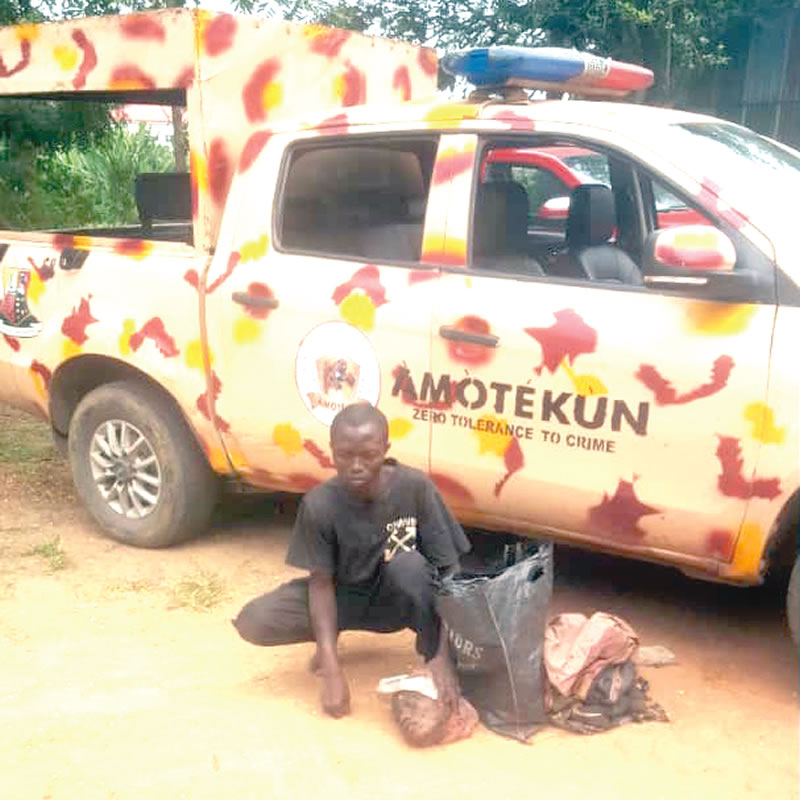metro
We get N5,000 for each human head —Suspected grave robbers

We get N5,000 for each human head —Suspected grave robbers
The two suspects found with a human head exhumed from a grave at Amuloko Area in Ibadan, Oyo State, and arrested by the personnel of the state command of the Western Nigeria Security Network (WNSN), codenamed Amotekun, have said that they used to get N5,000 as payment for the job done.
The suspects were identified as Mustapha Bello and Damilare Oladele.
Sunday Tribune learnt that while returning home, the suspects were accosted at dawn on Monday by a night guard who saw them carrying a bag, and when challenged, Bello, who was the one carrying the bag, tried to struggle with the security man, which gave Oladele the chance to escape.
Bello was eventually subdued and handed over to Amotekun for investigation.
When the news went round the city with the video recording of Bello when he was caught, it was learnt that a law enforcement agent who had noticed the closeness of Bello and Oladele suspected him of being the arrested suspect’s accomplice and challenged him same day in the evening.
The crowd, which had gathered, was said to have started beating the suspect, leading to his pleas and confession to being part of the operation carried out to get the human head.
He was also immediately transferred to Amotekun for investigation.
In an interview with Bello, a 32-year-old carpenter, he told Sunday Tribune: “I’m an Ibadan indigene living at Labo area. It is true that I went with my partner to exhume dead body and remove the head at Amuloko area.
“One Saheed was the one who brought me into this kind of work. He works as a security man. He asked me to follow him to work in a place when I told him I was not having money. He told me not to worry, promising to give me some money the following day. I asked him the kind of work we were going to do but he said he would let me know when we arrive the place.
READ ALSO:
- Osimhen eyes French giants, may snub Chelsea
- Ukraine attacks second bridge in Russia’s Kursk, heads for buffer zone
- FG moves against fake degrees, asks varsities to submit matriculation lists
“When we got to a gravesite in front of a residence at Ita Ege at about 1am, he opened up that we were there to get human head. We used cutlass and our hands to remove the mound of earth covering the grave. He removed the head and returned the remains into the grave.
“It is Saheed who used to sell the head. He used to give me N5,000 as my share.
“I went to the last operation with another accomplice, Damilare. After cutting the head, I was the one carrying it in a sack on our way back home when I was arrested by local vigilante. My partner escaped, and I was handed over to Amotekun.”
Explaining his involvement, the second suspect said: “I am Damilare Oladele. I’m from Ibadan and I live at Oranyan. I’m 25 years old. I’m a barber. I was arrested for exhuming a buried corpse and severing its head. Mustapha and I started working together in February this year.
 “Mustapha was the one who really knew about the operation and invited me. My role was to watch out for any approaching security man while he would be digging the grave to exhume the buried corpse.
“Mustapha was the one who really knew about the operation and invited me. My role was to watch out for any approaching security man while he would be digging the grave to exhume the buried corpse.
“Mustapha discussed the matter with me when we were relaxing one day. He had been doing it. The first time, he told me to go out with him that night as there was a task to be carried out. I asked him of the kind of task, and he opened up to me that we were going to get a human head. He told me that the one he targeted was already dry as it had been buried for long and it would not be smelly when being carried by us. He promised me the payment of N5,000 as my share.”
Disclosing his gang’s mode of operation, Oladele said: “We used to get to the area where we would get the human head at night at about 10 pm. We would hide in a place till after midnight when we would begin the exhumation at about 1 am.
“After the head had been removed, Mustapha would call me to cover the grave while he would go and hide the head. We would retire to our hiding spot and wait till dawn before we would go home.
READ ALSO:
- Six family members die after eating local delicacy in Kano
- Ganduje, Uzodinma 2027 joint-ticket campaign posters emerge on social media
- Osun: OSIEC swears in officers, group warns against LG poll fraud
“He was the one who would take the head to the buyer. After he had been paid, he would give me N5,000 as my share, except once when he gave me N10,000 because we went for a fresh head. I have worked with him five times.
“We did the last one at Amuloko in Ona Ara Local Government Area in the early hours of Monday. The place was described to Mustapha by one Afaa. They discussed it on the phone. The Afaa said that the corpse was recently buried.
“We went to work, removed the head and went to sleep in a nearby school until 5am when we left. Unfortunately for us, we met a night guard who sought to know what Mustapha was carrying. As they were dragging the issue with each other, I quickly took to my heels.”
How I was caught
“I went to my shop and returned to where I live in the evening to find out how things went with Mustapha. It was the person he used to give the head for sale who came to me. His name is Saheed. Saheed is a native doctor, and he was the one who introduced the operation to Mustapha. He stopped doing it and was only collecting the severed heads from Mustapha and paying him for the job done. That was why Mustapha asked me to join him in doing the work.
“He was the one who informed me that Mustapha had been handed over to Amotekun. He said he would be using his phone to monitor things.
“I was on my way back to my shop when I was seen by a security personnel. I learnt that the crowd recorded Mustapha’s arrest on video and posted it. The post was seen by the security agent and on seeing me, knowing very well that I was a close friend of Mustapha, he called me to come and take a look. He said that he believed I worked together with my friend. That was how the people around started beating me. I was handed over to Amotekun.”
Oladele confessed to smoking hemp and drinking alcohol but said that he stopped taking marijuana last year, sticking only to cigarettes.
We get N5,000 for each human head —Suspected grave robbers
metro
Mob Kills Injured Motorcycle Rider After AK‑47 Rifles, Ammunition Found in Crash Scene

Mob Kills Injured Motorcycle Rider After AK‑47 Rifles, Ammunition Found in Crash Scene
A motorcycle accident in Niger State turned deadly when an injured rider was beaten to death by a mob after a sack recovered from the crash scene was found to contain three AK‑47 rifles, six magazines, and 104 rounds of ammunition, police have confirmed. The incident occurred on Tuesday, February 17, 2026, along the Boyi‑Sarki/Toll Gate area in Suleja, as the riders travelled from Tafa in Kaduna State towards Abuja.
According to the Niger State Police Command, two men on a motorcycle collided with a road construction/diversion barrier in a lone accident. One rider died instantly from injuries sustained in the crash, while the second, who was injured, was lynched by a crowd that had gathered under the guise of helping. Both corpses were later taken to the General Hospital morgue in Suleja.
READ ALSO:
- Tacha Condemns False Rape Allegations After Mirabel Admits Fabrication
- UK Court Hands Life Sentence to Nigerian Teen for Knife Attack Killing
- Ogun Gov Rewards Nigeria’s Best Primary School Teacher with Car, Bungalow
Police confirmed that a sack belonging to the victims contained three AK‑47 rifles, six magazines, and 104 rounds of live ammunition, raising concerns about illegal firearms trafficking and potential criminal activity along the busy Kaduna‑Abuja corridor.
The Commissioner of Police, CP Adamu Abdullahi Elleman, condemned the act of jungle justice, stating that the injured rider could have assisted police in tracing the source of the weapons and exposing criminal networks. CP Elleman directed the Area Commander in Suleja to conduct a thorough investigation and arrest the perpetrators. The recovered rifles are currently undergoing ballistic analysis for further investigation.
The Niger State Police Command emphasised that mob justice endangers lives, obstructs investigations, and undermines the rule of law. Authorities called on citizens to report crimes and suspicious activities to law enforcement rather than resorting to violence.
Security analysts warn that incidents like this highlight broader challenges in parts of northern Nigeria, including illegal arms proliferation, mob violence, and the risks of self-help justice. Communities are urged to cooperate with law enforcement to ensure public safety and accountability.
Mob Kills Injured Motorcycle Rider After AK‑47 Rifles, Ammunition Found in Crash Scene
metro
Police Bust Gang Armoury, Arrest Two Suspects in Delta

Police Bust Gang Armoury, Arrest Two Suspects in Delta
The Delta State Police Command has made a major breakthrough in its fight against armed gangs and violent crime by arresting two suspected armed robbers and uncovering a gang armoury containing locally fabricated firearms and ammunition.
According to the Command, the operation reflects a renewed commitment to dismantle criminal networks, recover illegal weapons, and ensure public safety. Commissioner of Police Aina Adesola stated that the Command “remains resolute in dismantling criminal networks, mopping up illegal firearms, and ensuring that perpetrators of violent crimes are brought to justice.”
The raid followed intelligence-led investigations that led operatives of the Special Assignment Team (CP‑SAT), under ASP Julius Robinson, to a suspected criminal hideout along the Sapele–Warri Road near Adeje Community in the early hours of February 19, 2026. The operation was linked to the interrogation of 25-year-old Dafiaga Timothy from Effurun, allegedly associated with a gang terrorising commuters along the Warri–Sapele axis.
READ ALSO:
- Peter Obi Launches ‘Village Boys Movement’ to Rival Tinubu’s City Boys Ahead of 2027
- Woman Dies in Bandits’ Camp After Family Pays ₦25 Million Ransom
- Reno Omokri Alleges El-Rufai, Sons Linked to Dadiyata’s Disappearance
Police recovered a locally fabricated long gun, a cut-to-size firearm, and a Beretta-style pistol loaded with five rounds of live ammunition, along with ten additional cartridges and a dagger. The Command described the seizure as a major disruption to the operational capability of the gang, while investigations continue to identify other suspects and trace the source of the arsenal.
In a related operation on February 18, 2026, officers from the Area Command in Warri intercepted a tricycle along the Agbarho/Warri Expressway. Two occupants fled, but the driver, Aliyu Sabo, 25, was arrested. A search uncovered a locally fabricated pistol, one live cartridge, one expended cartridge, and several other items, including mobile devices and a bag suspected to be linked to criminal activity. Sabo remains in custody as police work to apprehend his accomplices.
The Delta State Police emphasized that these operations form part of a broader campaign to curb violent crime, illegal firearms proliferation, and gang-related activities across the state. Authorities have urged residents to remain security-conscious and report credible information that could aid ongoing investigations.
The discovery is expected to have a significant impact on reducing armed robberies and cult-related violence, particularly along high-risk corridors such as Sapele–Warri Road and Agbarho/Warri Expressway, which have long been affected by criminal syndicates.
Police Bust Gang Armoury, Arrest Two Suspects in Delta
metro
Woman Dies in Bandits’ Camp After Family Pays ₦25 Million Ransom

Woman Dies in Bandits’ Camp After Family Pays ₦25 Million Ransom
The family of seven abducted residents in Erinmope-Ekiti, Moba Local Government Area, Ekiti State, is mourning the death of one of the victims, identified as Hawau Suleiman, who reportedly died in captivity, even after her family paid a ₦25 million ransom for the release of the hostages. Six other abductees were freed following the payment, but the deceased’s remains have not yet been recovered.
The victims were initially kidnapped on January 24, 2026, when armed gunmen stormed the community, abducting five women, including a nursing mother and a pregnant woman. The kidnappers initially demanded a ₦100 million ransom for their release.
Family members first raised ₦10 million and sent two relatives to deliver the money, but the kidnappers rejected the amount and detained the emissaries, increasing the number of captives to seven. After further negotiations, a total of ₦25 million was paid, resulting in the release of six abductees.
One of the freed victims, Muhammad Soliu, who had also been detained as part of the ransom negotiation, recounted the harrowing conditions in captivity. He said the abductees were tied together like goats and forced to trek several kilometres barefoot through dense forests spanning Ekiti, Kwara, and Kogi states.
READ ALSO:
- Reno Omokri Alleges El-Rufai, Sons Linked to Dadiyata’s Disappearance
- UK-Based Nigerian Gets 13-Year Jail Term for Forcing Girlfriend to Abort Pregnancy
- Lawmaker Jailed for Mocking President in Facebook Post
Soliu revealed that the deceased, Hawau Suleiman, became too weak to continue the trek and collapsed. “She was exhausted from the long distance we were made to walk. We pleaded with them to allow us carry her, but they threatened to kill us if we stopped. They ordered us to keep moving without looking back. It was the worst experience of my life,” he said.
He added that the pregnant woman among the captives was taken to an undisclosed hospital for medical attention, while locating Suleiman’s remains would be difficult due to the depth and density of the forest where she reportedly died.
Sunday Abutu, the Police Public Relations Officer in Ekiti State, said the command would investigate the incident and provide further details, but no official updates have yet been released regarding the recovery of the deceased.
The ordeal highlights the growing kidnapping crisis in Ekiti and southwestern Nigeria, where families are often forced to pay large ransoms under threats of violence, and victims face life-threatening conditions in captivity. Security analysts continue to warn that ransom payments, while sometimes saving lives, may embolden criminal gangs and perpetuate the cycle of banditry and insecurity.
Woman Dies in Bandits’ Camp After Family Pays ₦25 Million Ransom
-

 International2 days ago
International2 days agoCanada Opens New Express Entry Draw for Nigerian Workers, Others
-

 Politics12 hours ago
Politics12 hours agoPeter Obi Launches ‘Village Boys Movement’ to Rival Tinubu’s City Boys Ahead of 2027
-

 News2 days ago
News2 days agoKorope Drivers Shut Down Lekki–Epe Expressway Over Lagos Ban (Video)
-

 Health3 days ago
Health3 days agoRamadan Health Tips: Six Ways to Stay Hydrated While Fasting
-

 News19 hours ago
News19 hours agoPolice to Arrest TikToker Mirabel After She Recants False Rape Claim
-

 Entertainment3 days ago
Entertainment3 days agoActress Destiny Etiko Breaks Silence on Alleged Nollywood Betrayal
-

 metro2 days ago
metro2 days agoOsun Awards 55.6km Iwo–Osogbo–Ibadan Road Project to Three Contractors
-

 International21 hours ago
International21 hours agoEpstein, Ex-Israeli PM Named in Alleged Profiteering From Boko Haram Crisis















